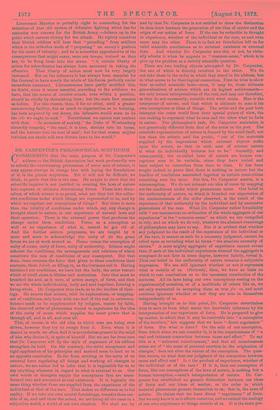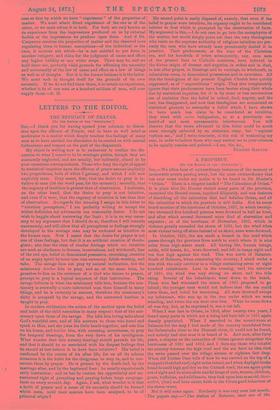DR. CARPENTER'S PHILOSOPHICAL SCEPTICISM.
CONSIDE RING that the main purpose of Dr. Carpenter's address to the British Association last week professedly was to rebuke the overweening pretensions of some men of science, it may appear strange to charge him with laying the foundations of it in the purest scepticism. Yet it will not be difficult, we -think, to prove that this is the case. He sought to show that the scientific inquirer is not justified in erecting the laws of nature into supreme or ultimate determining forces. These laws them- selves, of which science is so proud, what are they but the collec- tive conditions under which things are represented to us, and by which we regulate our conceptions of things ? But there is more than the totality of conditions under which, say, any change is brought about in nature, in our experience of natural laws and their operation. There is the external power that produces the change under these conditions. Force, as a conception as well as an experience of what is, cannot be got rid of. And the further science progresses, we are taught by it more and more to acknowledge the unity of all the great forces we see at work around us. Hence comes the conception of unity of cause, unity of force, unity of authorship. Science might exhaust the conditions, the arrangements and relations of which constitute the sum of conditions of any consequent. But that clone, there remains the force that gives to these conditions their contents, their In/loll, or filling-in, as the Germans call it. Having tabulated our conditions, we have but the body, the outer vesture which of itself alone is lifeless and motionless. Into that must be breathed the soul, as it were, of active energy, of force, and then we see the whole individuality, body and soul together, forming a living whole. Dr. Carpenter thus leads us to the borders of theo- logy. He asserts that science, with its explanations, or mapping- out of conditions, only deals with one-half of the real in existence. Science needs to be supplemented by religion, reason by faith, the observed order of phenomena traced in experience by the idea of the unity of cause which supplies the inner power that is through all, and in all, and over all.
This, of course, is the old idea to which men are being ever driven, however they try to escape from it. Even when it is denied in words, we often find it is nevertheless present in the mind of him who denies it, in spite of himself. But we are far from sure that Dr. Carpenter will by the style of argument of his address strengthen its hold. On the contrary, the strict acceptance and rigid application of his principles and method seem to land us in an opposite conclusion. So far from arriving at the unity of an external force regulating all things and working all changes in nature, we are rather led to infer that it is impossible for us to say anything whatever in regard to what is external to us. Our own minds or thoughts supply the conceptions that are trans- formed into and accounted as real existences. It is logically the same thing whether these are supplied from the experience of the individual or that of the race. That makes no difference as to the reality. If we take our own mental furnishings, transfer them out- side of us, and call them the actual, we are living all the same in a subjective world, a world of our own creation. We shall see by and by that Dr. Carpenter is not entitled to draw the distinction he does draw between the generation of our idea of matter and the origin of our notion of force. If the one be reducible to thought or experience, whether of the individual or the race, so and even more may the other. There is in fact no foundation left us for valid scientific conclusions as to external existence or external laws. And whether Dr. Carpenter sees this or not, he virtu- ally admits it when he appeals to "common-sense," which is to give up the problem as a strictly scientific question.
There are two leading objects attempted by Dr. Carpenter, the one of which is directly involved in the other. We do not take these in the order in which they stand in his address, but in what seems to be their logical connection. First he tries to show that so-called scientific laws—even, it may be, those ultimate generalisations of science which are its highest achievements— are only human interpretations of the real, and may not therefore, as they do not necessarily, coincide with what exists. Man is the interpreter of nature, and that which is ultimate to man is his own conceptions or ideas of things. The artist and the poet both interpret the outer world from their special points of view, the one seeking to represent what he sees and the other what he feels in nature. The philosopher's task, Dr. Carpenter maintains, is not generically different from that of the artist or the poet. The scientific representation of nature is framed by the mind itself, not less than the artistic and the poetic, "out of the materials supplied by the impressions which external objects make upon the senses, so that to each man of science nature is what he individually believes her to be." Secondly, and consequently, the so-called laws of nature are human con- ceptions seen to be variable, since they have varied and been subject to correction from time to time. it has been sought indeed to prove that there is nothing in nature but the bundles of conditions associated together in certain connections remaining ever the same. But this, Dr. Carpenter asserts, is a misconception. We do not exhaust our idea of cause by mapping out the conditions under which phenomena occur. Our belief in the uniformity of nature, on which is founded our expectation of the continuousness of the order observed, is the result of the experience of that uniformity by the individual and by successive generations of the race. What Dr. Carpenter rather formidably calls "our unconscious co-ordination of the whole aggregate of our experiences" is the "common-sense" on which we are compelled to rely, and on which we do rely, whatever the abstract reasonings of philosophers may have to say. But it is evident that whether any judgment be the result of the experience of the individual or of the race, it cannot as such be a necessary judgment, cannot be relied upon as revealing what he terms "the absolute necessity of nature." A mere mighty aggregate of experience cannot reveal that, if each of the individual experiences whereof the aggregate is composed do not first in some degree, however faintly, reveal it Thus our belief in the uniformity of nature remains a subjective impression. We are still ignorant whether or not it represents what is outside of us. Obviously, then, we have no basis on which to rest conclusions as to the necessary constitution of the universe. All its laws being our own conceptions resting on the experiences!of ourselves, or of a multitude of others like us, we are only warranted in accepting them as true for us, and must continue ignorant whether or not they are true in themselves independently of us.
Having brought us to this point, Dr. Carpenter nevertheless tries to save us from what seems the inevitable inference by his interpretation of our experience of force. He is prepared to give up matter, to admit that it may be resolvable into "a conception of the intellect," but suggests that we have "direct cognisance" of force. But what is force ? On the side of our conception, from which alone we can consider it, it is the consciousness of "a real and intimate connection between cause and effect." To say this is a "universal consciousness," and that all consciousness arises out of "the sense of personal exertion in the origination of changes," does not alter the nature of the conception. The ques- tion recurs, on what does our judgment of the connection between cause and effect rest? Is it the product of experience, whether of the individual or of the race If it is, then our conception of force, like our conceptions of the laws of nature, is nothing but a human conception,—man's interpretation of nature. Dr. Car- penter has established no generic distinction between our ideas of force and our ideas of matter, or the order in which material phenomena present themselves to us; that is, the laws of nature. He claims that we have direct " cognisance " of force. But we only know it as it affects ourselves, and we extend the analogy of our own experience to things outside of us. It is the same pro-



































 Previous page
Previous page